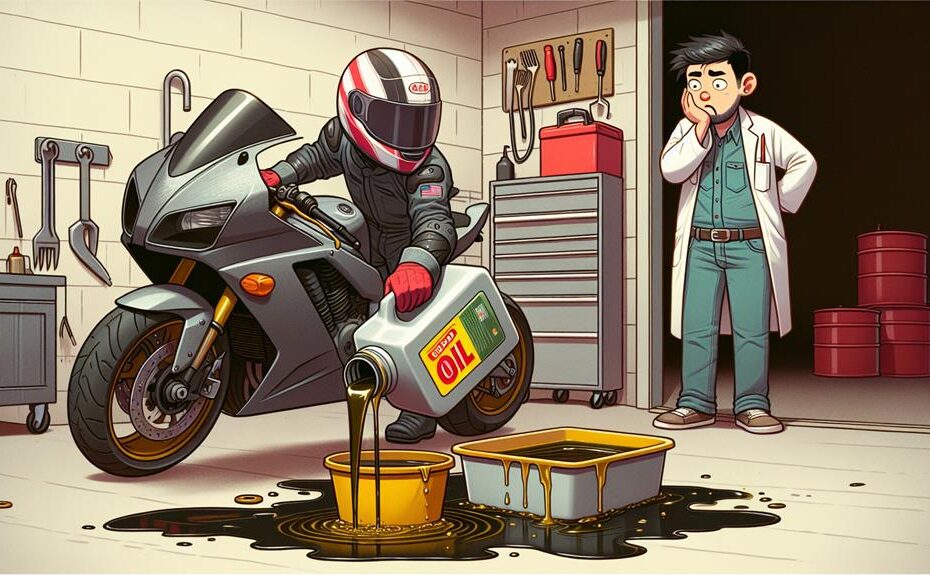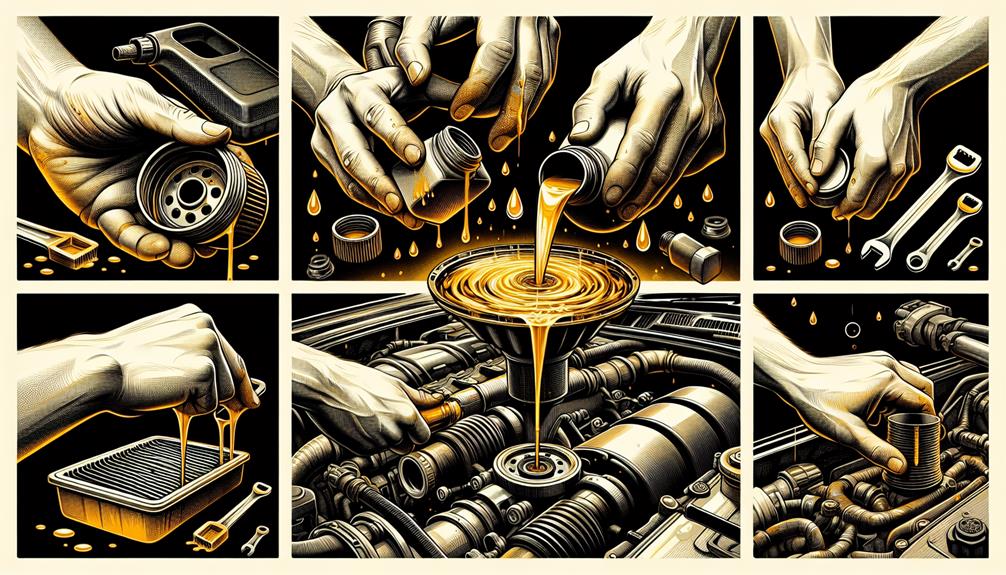Imagine your car's engine as a well-oiled machine, smoothly purring with every turn of the key. Now, picture that same engine struggling, grinding, and sputtering due to a simple mistake during an oil change. Don't let this scenario become a reality.
In order to keep your engine running at its best, there are several crucial mistakes you need to avoid. So, buckle up and prepare to discover the secrets to a successful oil change – because your car's performance depends on it.
Key Takeaways
- Choosing the right oil type with the correct viscosity range is crucial for proper lubrication and engine performance.
- Regularly replacing the oil filter with every oil change ensures effective removal of dirt and contaminants, preventing engine wear.
- Maintaining the correct oil level, neither overfilling nor underfilling, is essential for smooth engine operation and preventing damage.
- Adhering to the recommended oil change interval, regardless of using synthetic oil, is important to prevent serious engine problems and maintain optimal performance.
Choosing the Wrong Oil Type
Choosing the wrong oil type for your oil change can lead to detrimental effects on your engine's performance and longevity. When it comes to selecting the correct viscosity, it's crucial to understand the specifications recommended by your vehicle manufacturer. Viscosity refers to the oil's resistance to flow at different temperatures. Using oil with the wrong viscosity can result in inadequate lubrication, leading to increased friction and wear on engine components.
To ensure you choose the right viscosity, refer to your vehicle's owner manual or consult with a trusted mechanic. The manual will provide you with the recommended viscosity range for different temperatures. It's important to note that using oil with a higher viscosity than recommended can cause poor engine performance, while using oil with a lower viscosity can lead to increased oil consumption and engine wear.
In addition to viscosity, understanding oil additives is crucial for choosing the right oil type. Oil additives are chemical components that enhance the oil's performance and provide additional protection to the engine. They can improve viscosity stability, reduce friction, prevent corrosion, and keep the engine clean. Different additives serve specific purposes, such as detergents to prevent deposits and dispersants to keep contaminants suspended in the oil.
When selecting an oil type for your oil change, ensure that it meets the recommended viscosity and contains the necessary additives to keep your engine running smoothly and efficiently. By choosing the correct oil type, you can maximize your engine's performance and extend its longevity.
Neglecting to Replace the Oil Filter
Neglecting to replace the oil filter during an oil change can have serious consequences for your engine's health and performance. The oil filter plays a crucial role in maintaining the cleanliness of your engine oil by removing dirt, debris, and contaminants. Over time, the filter becomes clogged with these particles, reducing its effectiveness and restricting the flow of oil to the engine. This can lead to increased engine wear, decreased fuel efficiency, and potentially even engine failure.
One of the most common oil filter mistakes is forgetting to replace it altogether. Some car owners may believe that the filter can be cleaned and reused, but this isn't recommended. Oil filters are designed to be disposable and should be replaced with every oil change. Another mistake is using a low-quality or incorrect oil filter. It's important to choose a filter that's compatible with your vehicle's make and model, as well as one that meets the manufacturer's specifications. Using a subpar filter can result in poor filtration and inadequate protection for your engine.
Regular oil filter replacement is of utmost importance to ensure the longevity and optimal performance of your engine. By neglecting this crucial step, you risk compromising the health and efficiency of your engine. So, when it's time for your next oil change, remember to include the replacement of the oil filter to keep your engine running smoothly.
Overfilling or Underfilling the Oil
Improper oil level can have detrimental effects on your engine's performance and longevity. It's crucial to ensure that your oil is neither overfilled nor underfilled during an oil change. Here are a couple of key points to keep in mind to avoid this common mistake:
- Overfilling the oil:
Contrary to popular belief, overfilling the oil doesn't provide better lubrication or protection for your engine. In fact, it can lead to excessive pressure inside the engine, causing oil leaks, foaming, and increased wear on engine components.
Overfilled oil can also lead to a significant drop in fuel efficiency and may even damage the catalytic converter, resulting in costly repairs.
- Underfilling the oil:
Underfilling the oil can lead to inadequate lubrication, causing increased friction and heat in the engine. This can result in premature wear of engine parts and reduced engine performance.
It's essential to follow the manufacturer's guidelines and use the recommended oil volume to ensure optimal engine performance and longevity.
Regular oil changes are of utmost importance to maintain your engine's health. Don't fall for common oil change myths that suggest overfilling or underfilling the oil can benefit your engine. By adhering to the correct oil level, you can ensure smooth engine operation and extend the lifespan of your vehicle.
Ignoring the Recommended Oil Change Interval
Are you aware of the potential consequences of disregarding the recommended oil change interval? Many car owners have common misconceptions about oil change intervals, believing that they can extend the time between changes without any negative effects. However, ignoring the recommended oil change interval can lead to serious engine problems and costly repairs.
The recommended oil change interval is based on various factors such as the type of oil used, driving conditions, and the manufacturer's guidelines. It's important to follow these recommendations to ensure optimal engine performance and longevity.
One of the common misconceptions about oil change intervals is that using synthetic oil allows for longer intervals. While synthetic oil does have superior performance characteristics, it's still essential to follow the manufacturer's recommended oil change interval. Synthetic oil may offer better protection against engine wear, but it can still break down over time and lose its effectiveness.
Another crucial aspect to consider is the importance of using the right oil viscosity. The viscosity of the oil determines its flow characteristics and ability to lubricate the engine components properly. Using the wrong viscosity can lead to increased friction, poor lubrication, and engine damage. Always refer to the owner's manual or consult with a professional to determine the correct viscosity for your vehicle.
Failing to Properly Tighten the Oil Drain Plug
Failing to properly tighten the oil drain plug can result in oil leaks and potential engine damage. To avoid these issues, it's crucial to understand the common causes of oil drain plug leaks and the importance of using a torque wrench for tightening the plug.
Here are some key points to keep in mind:
- Common causes of oil drain plug leaks:
- Over-tightening or under-tightening the plug: Both can cause the plug to loosen over time, leading to leaks.
- Using a worn-out or damaged plug: A damaged or worn-out plug may not create a proper seal, resulting in leaks.
- Failing to replace the drain plug gasket: The gasket provides a tight seal between the plug and the oil pan. Neglecting to replace it during an oil change can lead to leaks.
- Importance of using a torque wrench for tightening the oil drain plug:
- Ensures proper tightness: Using a torque wrench allows you to tighten the plug to the manufacturer's recommended specifications, preventing over-tightening or under-tightening.
- Avoids damaging the plug or oil pan: Over-tightening the plug can strip the threads or crack the oil pan, while under-tightening can cause the plug to loosen and result in leaks.
Frequently Asked Questions
How Often Should I Check My Oil Level Between Oil Changes?
You should check your oil level regularly between oil changes to ensure proper lubrication and prevent engine damage. Regular oil checks are important for maintaining the overall health and longevity of your vehicle.
Can I Mix Different Brands or Types of Oil?
Yes, you can mix different brands or types of oil, but it's not recommended due to compatibility concerns. Mixing oils with different additives and viscosity can affect performance and potentially damage your engine.
Should I Warm up My Car Before Changing the Oil?
Before changing the oil, it is not necessary to warm up your car. Starting the engine and idling for a few minutes is sufficient. Cold oil has higher viscosity, which makes it easier to drain.
Is It Necessary to Use a Torque Wrench to Tighten the Oil Drain Plug?
It's not necessary, but it is highly recommended to use a torque wrench when tightening the oil drain plug. This ensures proper tightness and prevents leaks or damage to the oil pan.
Can I Reuse the Oil Filter During an Oil Change?
Yes, you can reuse the oil filter during an oil change, but it is not recommended. Reusing the filter can lead to reduced filtration efficiency and potential engine damage. Proper oil filter maintenance is essential for a successful oil change.
Conclusion
In conclusion, avoiding common mistakes during an oil change is crucial for a successful maintenance routine. Neglecting to replace the oil filter can lead to engine damage, while overfilling or underfilling the oil can affect performance.
Ignoring the recommended oil change interval can result in decreased engine lifespan. Additionally, failing to properly tighten the oil drain plug can cause leaks and further complications.
Interestingly, studies show that using the wrong oil type is responsible for 20% of engine failures, highlighting the importance of selecting the correct oil for your vehicle.



